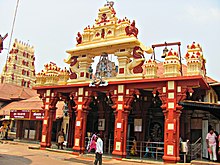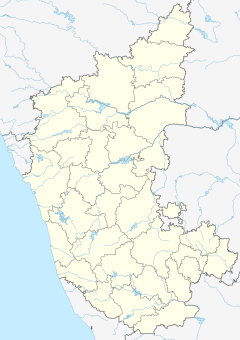Udupi Sri Krishna Matha
| Shri Krishna Temple Udupi | |
|---|---|
ಉಡುಪಿ ಶ್ರೀ ಕೃಷ್ಣ ದೇವಸ್ಥಾನ | |
 Krishna Temple, Udupi | |
| Religion | |
| Affiliation | Hinduism |
| Deity | Krishna |
| Location | |
| Location | Udupi |
| State | Karnataka |
| Country | India |
| Geographic coordinates | 13°19′56″N 74°44′46″E / 13.33222°N 74.74611°E |
| Architecture | |
| Type | Kerala architecture |
| Completed | 13th Century |
| Part of a series on |
| Dvaita |
|---|
| Hinduism portal |
Udupi Shri Krishna Temple is a well-known historic Hindu temple dedicated to Krishna and Dvaita Matha located in the city of Udupi in Karnataka, India. The Matha area resembles a living Aashram, a holy place for daily devotion and living. Surrounding the Shri Krishna Temple are several temples namely the Udupi Anantheshwara Temple which is over a thousand years old.[1]
History

The Krishna Matha was founded by the Vaishnavite saint Madhvacharya in the 13th century. He was the founder of the Dvaita school of Vedanta. It is believed that Madhvacharya found the vigraha of Krishna in a large ball of gopichandana.[2] As told by Madhvacharya in his Tantrasara Sangraha, the Vigraha was placed initially in the east direction. Due to intense devotion shown by kanakadasa, the deity is said to have turned Pashchimabhimukha (facing west). All the other Vigrahas in other Ashta Muthas face west as well. Devotees always have darshan of Krishna through the inner window, known as the Navagraha Kindi and the outer window known as the Kanakana Kindi, which is decorated by an arch named after the saint Kanakadasa. A statue has also been erected. A similar window covers the immediate front of the Vigraha and is called Navagraha Kindi. It is often mistaken to be the Kanakana Kindi.[3]
The temple opens at 5:30 hours IST. The unique feature of the temple is that the deity is worshipped through a silver-plated window with nine holes (Navagraha Kindi).[4] The temple also offers prasada at noon and is popularly called Anna Brahma as it feeds a vast number of devotees.
Krishna Matha
The daily sevas (offerings to god) and administration of the Krishna Mathas is managed by the Ashta Mathas (eight monasteries). Each of the Ashta Mathas performs temple management activities for two years in a cyclical order. They are collectively known as the 'Ashta Mathagalu' in Kannada. Each Ashta Matha has its own deity which is called Pattada Devaru.
The Krishna Matha is known for its religious customs, traditions and tenets of Dvaita or Tatvavada philosophy. It is also the center of Daasa Saahitya, a form of literature that originated in Udupi.
These eight Mathas are:
- Palimaru Matha
- Admaru Matha
- Krishnapura Matha
- Puttige
- Shirur Matha
- Sodhe Matha
- Kaniyoor Matha
- Pejavara
The expenses of Udupi Krishna Matha are borne by the voluntary contributions of the devotees and by the Ashta Mathas that manage the Krishna Matha. The contribution may be in cash or kind. The Krishna Matha, which owned large tracts of land, lost it all in 1975 due to the enactment of the Land Reforms Act 1975 by the Government of Karnataka.
The Pauli of Krishna Matha was renovated and the Brahmakalashotsava ceremony was held on 18 May 2017.[5]
Swamis of the Ashta Mathas
The Swamis of the Ashta Mathas and their successors are as follows.
| Matha | Current Swaameejee | Successor or Junior |
|---|---|---|
| Pejavara | Shri Vishvaprasanna Teertha Swamiji | |
| Palimaru | Shri Vidyadeesha Teertha Swamiji | Shri Vidyarajeshwara Teertha Swamiji |
| Adamaru | Shri Vishvapriya Teertha Swamiji | Shri Eeshapriya Teertha Swamiji |
| Puttige | Shri Sugunendra Teertha Swamiji | Shri Sushreendra Teertha Swamiji |
| Sodhe | Shri Vishwavallabha Teertha Swamiji | |
| Kaniyooru | Shri Vidyavallabha Teertha Swamiji | |
| Shirur | Shri Vedavardhana Teertha Swamiji | |
| Krishnapura | Shri Vidyasagara Teertha Swamiji |
Festivals

During the Paryaya festival, held once every two years, the temple management is handed over to the next Ashta Matha, which has been entrusted the responsibility of running the temple turn by turn. Each of the Mathas is headed by a swami, who will be in charge of the temple during his Paryaya. The Paryaya is held on even years The Paryaya tradition has completed 500 years as of 2021.[6] Presently, Admaru Math is administering the temple with Junior Pontiff Sri Eshapriya Teertha Swami[7] ascending the post of Sarvajna or Paryaya Peetha. Festivals like Makara Sankranthi, Ratha Sapthami, Madhva Navami, Hanuman Jayanthi, Sri Krishna Janmashtami, Navarathi Mahotsava, Madhva Jayanti, Vijaya Dashami, Naraka Chathurdashi, Deepavali, and Geetha Jayanthi are celebrated by Paryaya Mutt every year.[8]
Gallery
-
Sri Krishna Matha during Paryaya festival January 2022
-
Temple painted in yellow-red
-
Brahma ratha of Udupi Krishna
-
Goshala at Udupi Sri Krishna Temple
-
The Chariot at Udupi Sri Krishna Temple
-
Golden Chariot of Udupi Sri Krishna Temple
-
Base of Navarathna Chariot
-
Udupi Sri krishna Temple pond
References
- ^ South India. Lonely Planet. 2009. ISBN 9781741791556.
- ^ Lalit Chugh (23 May 2017). Karnataka's Rich Heritage – Temple Sculptures & Dancing Apsaras: An Amalgam of Hindu Mythology, Natyasastra and Silpasastra. Notion Press. p. 41. ISBN 9781947137363. Retrieved 23 May 2017.
- ^ Manu V. Devadevan (10 October 2016). A Prehistory of Hinduism. Walter de Gruyter GmbH & Co KG. p. 120. ISBN 9783110517378. Retrieved 10 October 2016.
- ^ S. Anees Siraj (2012). Karnataka State: Udupi District. Government of Karnataka, Karnataka Gazetteer Department. p. 999.
- ^ "Brahmakalashotva celebrations held at Sri Krishna Mutt". udayavani.com. Retrieved 27 May 2017.
- ^ "CM to inaugurate new free darshan pathway in Udupi temple". The Hindu. 18 January 2021. ISSN 0971-751X. Retrieved 21 January 2021.
- ^ "Udupi: Eshapriya Teertha Swamiji to ascend Paryaya on Jan 17". coastaldigest.com - The Trusted News Portal of India. Retrieved 21 January 2021.
- ^ "Udupi Sri Krishna Matha". karnataka.com. Retrieved 27 May 2017.
External links
- Sri Krishna Temple, Udupi Archived 22 July 2019 at the Wayback Machine
- Temples in Udupi Archived 3 October 2018 at the Wayback Machine
- Udupi Shri Krishna photos
- Udupi Shri Krishna Temple and related information guide Archived 22 May 2011 at the Wayback Machine










